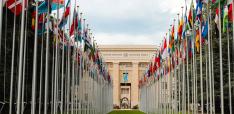Ally or Liability? Israel's Actions Impact on U.S. Global Credibility

Mohsen Solhdoost explores how Israel’s actions following October 7th, 2023, challenge U.S. advocacy for a consistent, rules-based international order, putting its moral authority and global leadership at risk.
Since the end of the Cold War, the United States has sought to position itself as a global leader in promoting a rules-based international order, advocating for adherence to international norms, the protection of human rights, and the integrity of institutions like the United Nations. With this global posture, the U.S. aimed to present itself as the guarantor of global stability and a proponent of accountability, striving to strengthen international institutions to foster cooperative security and prosperity.
In the Middle East, Israel has long stood as one of the closest allies to the U.S., benefiting from unwavering American support in defense, economic, and diplomatic spheres since the establishment of the Jewish state in 1948. The attack carried out by Hamas on October 7th, 2023 – an operation which “constituted war crimes and violations and abuses of international humanitarian law and international human rights law” – highlighted the severe security threats Israel faces. Like all states, Israel has the right to defend itself in the face of such aggression.
However, Israel’s actions following October 7th 2023 – including the killing of United Nations Relief and Works Agency (UNRWA) staff, attacks on United Nations Interim Force in Lebanon (UNIFIL) installations and other UN-run civilian sites, disregard for UN resolutions, and dismissal of both International Court of Justice (ICJ) and International Criminal Court (ICC) rulings – have presented significant challenges to the U.S.-led post-Cold War order.
These actions cast doubts about the U.S.’s capacity to uphold a rules-based international framework whose amorphous character and America’s selective approach have already drawn criticism from scholars of international relations. In allowing Israel’s course of action to persist without consequence, the U.S. risks further undermining its own credibility and moral authority on the world stage.
In the post-Cold War era, the United States invested heavily in constructing a framework that would champion international norms, advocating for peacekeeping missions, tribunals, human rights, and international law. This framework served dual purposes: encouraging global stability and extending American influence through institutions aligned with democratic principles.
However, the U.S. has often pursued a selective approach toward these international institutions and the rules-based system. While it supported bodies like the UN and ICC to promote diplomatic engagement and conflict resolution, it simultaneously refrained from fully committing to them when they conflicted with its national interests. For instance, the U.S. signed but did not ratify the Rome Statute of the ICC, thereby avoiding the court's jurisdiction over American personnel. Other key U.S.-endorsed policies such as the establishment of UN peacekeeping missions and support for international tribunals also provided mechanisms to manage international disputes and set accountability standards, yet the U.S. sometimes bypassed these mechanisms in favor of unilateral action. However, the U.S. has always expected its allies and partners to respect these institutions as part of a shared commitment to these ideals, even as it selectively engaged with them based on its own strategic considerations.
Moreover, the U.S. has pursued controversial policies with regards to other states’ compliance with its rules-based system. Whenever America’s post-Cold War rivals and adversaries failed to comply with the U.S.-led rules-based order, the United States has responded with decisive punitive measures, including harsh sanctions. For example, in response to Iran's nuclear program, which the U.S. viewed as a violation of non-proliferation norms, it imposed comprehensive economic sanctions aimed at crippling Iran's economy to force compliance. Similarly, North Korea faced stringent sanctions due to its development of nuclear weapons and ballistic missiles, actions that defied the U.S.-led rules-based order.
In contrast, the United States has taken a different stance when it comes to allies like Israel. Despite widespread acknowledgment that Israel possesses nuclear weapons and its decision not to sign the Treaty on the Non-Proliferation of Nuclear Weapons (NPT) and to refusal to make its nuclear facilities available for the International Atomic Energy Agency (IAEA) to inspect, the U.S. has totally overlooked Israel's non-compliance with international non-proliferation norms. Unlike its approach toward Iran and North Korea, where the U.S. imposed severe sanctions to deter nuclear development, it has not subjected Israel to similar punitive measures and only gently criticized Israel’s nuclear posturing. This disparity highlights the selective application of the rules-based order by the U.S., wherein allies may be exempted from the enforcement actions imposed on adversaries.
It is against this backdrop of U.S. post-Cold War posture that Israel’s actions following October 7th, 2023, further damage America’s international reputation. Israel’s post-October 7th military operations have so far contravened international norms on an unprecedented scale, causing the deaths of over 300 United Nations Relief and Works Agency (UNRWA) personnel and humanitarian aid workers. In the latest event in a series of contraventions of international humanitarian law, the Israeli army launched attacks on the United Nations Interim Force in Lebanon (UNIFIL), a peacekeeping mission established in 1978 and mandated to maintain peace and security near Lebanon’s border with Israel. Such incidents violate the principles of international protection for humanitarian missions, challenging the institutions that the U.S. champions as pillars of an international rules-based system.
Beyond military actions, Israel’s political stance toward UNRWA, including attempts to delegitimize the agency, demonstrates a lack of regard for the international community’s commitment to addressing humanitarian needs in conflict zones. Denying UNRWA Chief Philippe Lazzarini entry to Gaza and declaring UN Secretary-General António Guterres 'persona non grata', barring him from Israeli territory, are two examples of extreme measures that further undermine diplomatic protocols and the long-term credibility and efficacy of the UN. In another dramatic display of defiance, the Israeli ambassador to the UN shredded a copy of the UN Charter, symbolizing Israel's rejection of the organization's authority. By supporting Israel without addressing these violations, the U.S. inadvertently signals to the world that its closest allies are exempt from the accountability and compliance it expects from other nations, weakening the moral authority of the U.S.-led rules-based order.
Israel’s persistent disregard for UN resolutions, particularly those calling for humanitarian truce or condemning settlement expansions and illegal occupation practices, highlights a selective approach to international law that contradicts the U.S.’s advocacy for consistent rule enforcement. The ICC, though limited in its jurisdiction over Israel due to its non-membership, represents a critical component of international justice that the U.S. has, at least in principle, encouraged other nations to respect. In May 2024, the ICC Prosecutor’s decision to seek arrest warrants for leaders of both Israel and Hamas for war crimes and crimes against humanity was followed by ICJ ruling that Israel must halt any military offensive in Rafah that could harm civilians. However, Israel has vehemently rejected such rulings, asserting that the ICC, for example, lacks jurisdiction because Palestine is not a sovereign state and criticizing such moves as politically motivated.
These instances reflect Israel's pattern of dismissing international legal rulings and obligations when they conflict with national policies, sending a message of selective accountability. Subsequently, the U.S.'s rejection of ICC and ICJ rulings and its reluctance to hold Israel accountable not only erodes the standing of these international forums, but also weakens the credibility of the rules-based order the U.S. seeks to uphold, as it suggests that adherence to international norms is contingent upon strategic alliances rather than universal principles.
As Israel disregards international laws and violates global norms with impunity, the U.S. consequently finds itself in a defensive position when championing a rules-based order that centers upon human rights and international accountability. For instance, the U.S.’s double standards and lack of moral coherence resulted in harsh criticism from China and Russia, which offered an alternative approach based on absolute respect for “sovereignty” and “diversity of civilizations” at the Munich Security Conference in 2024.
In summary, Israel’s actions against UN personnel, disregard for UN resolutions, and dismissals of ICJ/ICC rulings present a significant challenge to the U.S.-championed rules-based order. For the U.S. to maintain its credibility as a global leader and advocate for international law, it must hold all its allies, including Israel, to the same standards of accountability. Failure to address these issues only further damages the U.S.'s standing, paving the way for a world order marked by selective adherence to the very laws the U.S. once sought to universalize.
Dr. Mohsen Solhdoost is an Assistant Professor at the Department of International Studies, Xi’an Jiaotong-Liverpool University (XJTLU). His research focuses on U.S. and China’s presence in the Middle East and examines complex security issues such as states’ interactions with non-state actors.
Photo by cottonbro studio
The views in this post do not reflect those of Global Policy or the journal's owners, and are solely the author's own.


